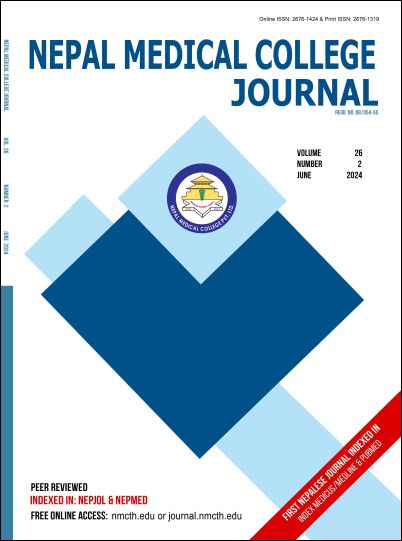Assessment of Knowledge, Attitude and Practice Regarding Vitamin D among Medical and Dental Students of a Medical College in Kathmandu
DOI:
https://doi.org/10.3126/nmcj.v26i2.67200Keywords:
Vitamin D, medical student, dental student, knowledge, attitude, practice, pre-test, post-testAbstract
Vitamin D deficiency is one of the very common nutritional deficiencies which usually go undiagnosed and untreated. The main objective of this study was to assess and compare the knowledge, attitude and practice of vitamin D among medical and dental students. The pre and post interventional study was conducted among first year students of Bachelor of Medicine and Bachelor of Surgery and Bachelor in Dental Surgery from July to September 2023. All the participants were asked to fill a form using a pre-validated questionnaire based on relevant literature for assessing vitamin D. We divided questions into three categories: knowledge, attitude, and practices towards vitamin D. Pre-test and post-test (after giving educational training) vitamin D knowledge, attitude and practice score of each participant were compared. Finally, the post-test total knowledge, attitude scores of each participant were calculated. Out of 140 students approached, 9 students from MBBS and 4 students from BDS did not respond (did not completed the questionnaire form). So, 127 (90.7%) participants were considered for comparison analysis in this study. Overall, there was a 38.6% increment in knowledge after educational training. In medical and dental students, there was a 39.6% and 36.1% gain in knowledge respectively. The proportion of knowledge increment was statistically significant (p<0.001). Also, overall, there was a 29.3% increment in their positive attitude. In Bachelor of Medicine and Bachelor of Surgery 22% positive attitude was developed after educational training and in Bachelor in Dental Surgery it was 47.2%. The proportion of attitude was statistically significant (p<0.001). In the MBBS category, 15 (15.0%) students were found to have good practice whereas 85 (85.0%) were found to have poor practice. In the BDS category, 12 (30.0%) students were found to have good practice whereas 28 (70.0%) were found to have poor practice. We found that after educational training there was improvement in knowledge and attitude of medical students on vitamin D but still, they need to implement it in their daily life. Though they have an average knowledge on vitamin D, there is a gap between knowledge and practice among medical students.
Downloads
Downloads
Published
How to Cite
Issue
Section
License
Copyright (c) 2024 Nepal Medical College Journal

This work is licensed under a Creative Commons Attribution 4.0 International License.
This license enables reusers to distribute, remix, adapt, and build upon the material in any medium or format, so long as attribution is given to the creator. The license allows for commercial use.




